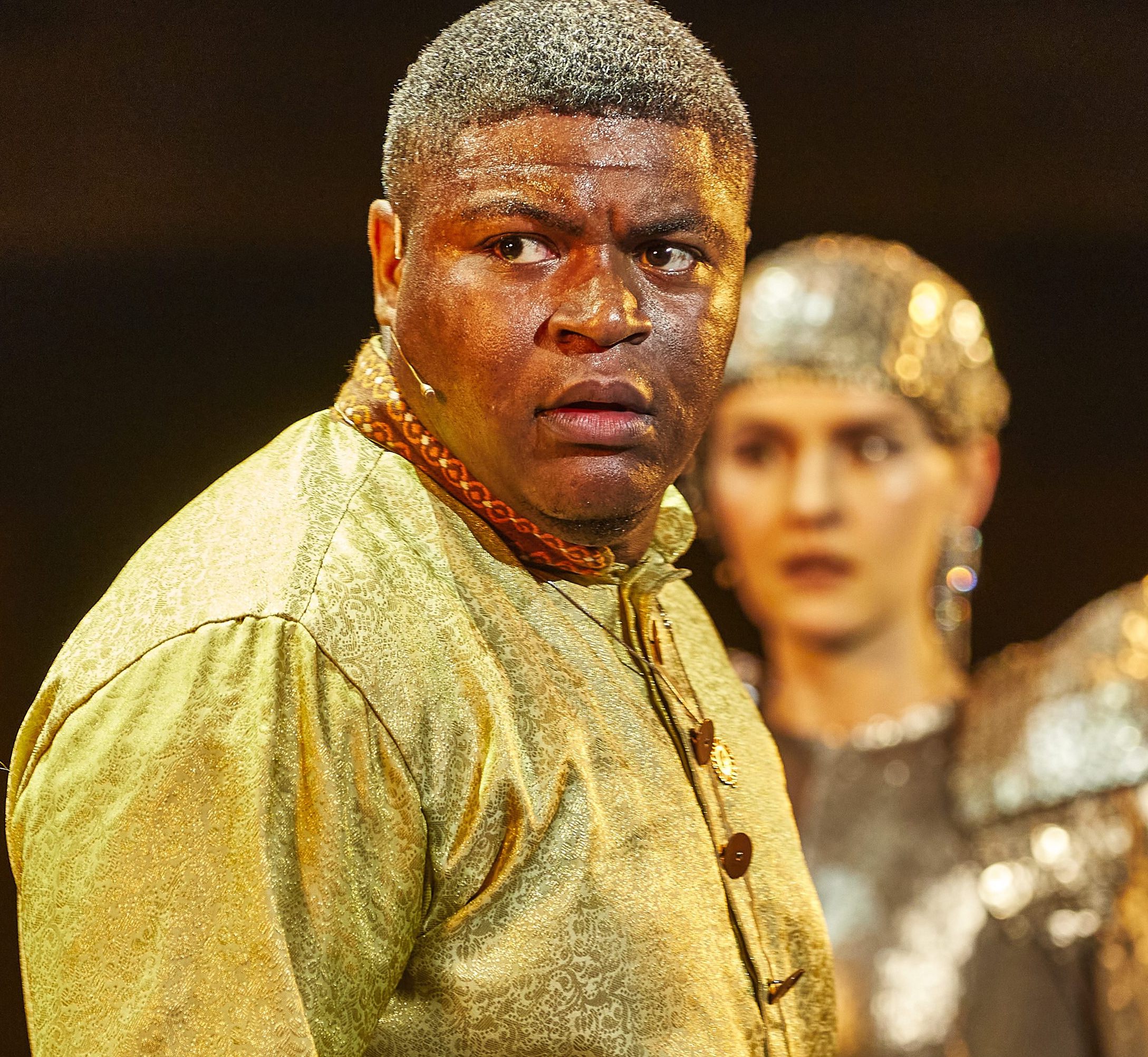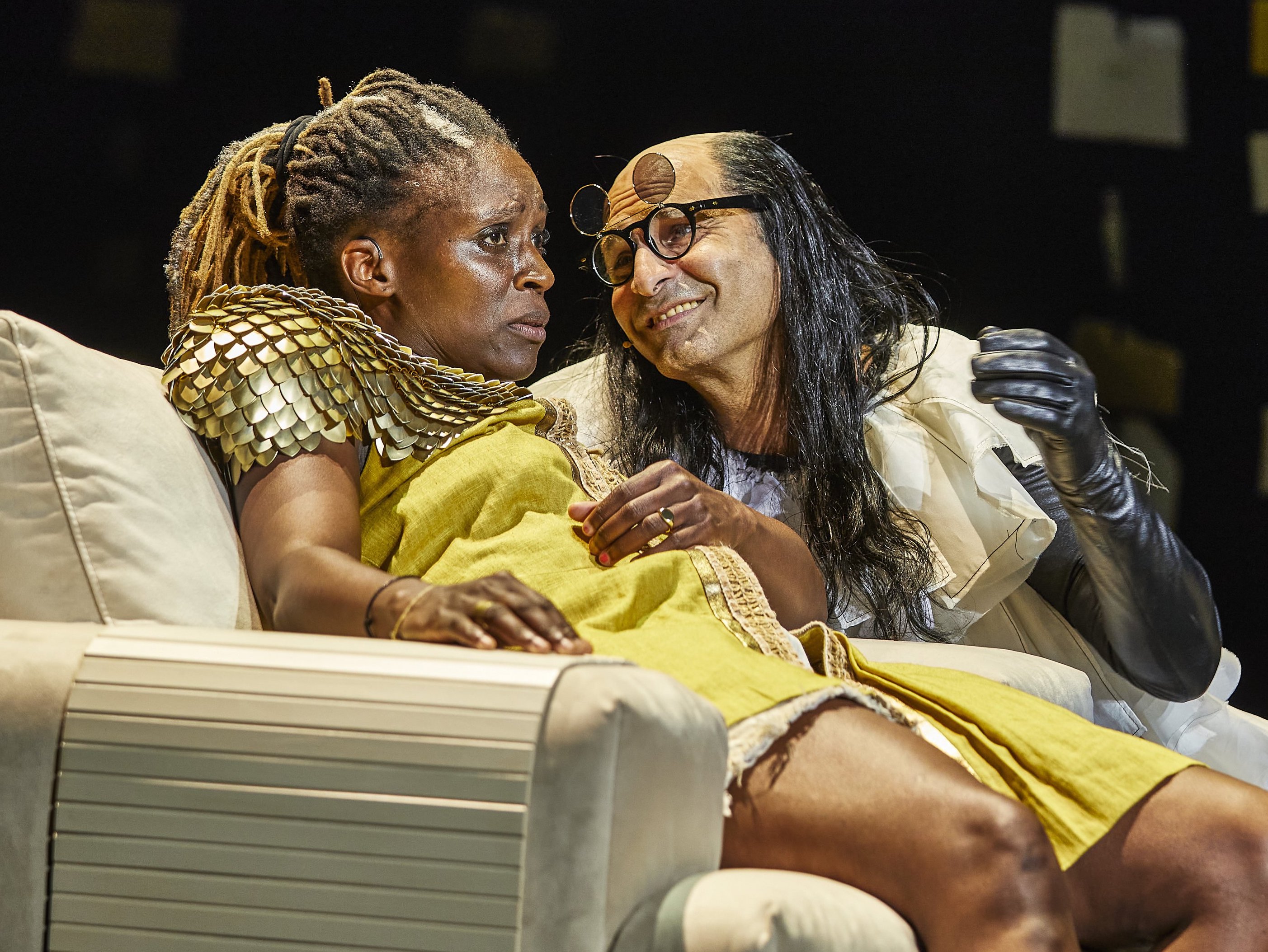The Odyssey: The Underworld, National Theatre review - community effort with real heart and a great staging | reviews, news & interviews
The Odyssey: The Underworld, National Theatre review - community effort with real heart and a great staging
The Odyssey: The Underworld, National Theatre review - community effort with real heart and a great staging
The Public Acts project creates a model mix of high and low for a modern ensemble
One of the great wonders of Western literary history is one of the earliest, Homer’s The Odyssey, an epic poem with all the thrills and spills of an Indiana Jones outing, with added Olympians. The National’s version turned out not to be The Odyssey as we know it, though.
Billed as a “new play” by Chris Bush, with music by Jim Fortune, it was the fifth instalment of a Public Acts project, following the massed efforts of four amateur groups across the country – in Stoke, Sunderland, Doncaster and Trowbridge – which performed a different section of the story each, from four different writers. Members of these four ensembles were then recruited to join a London one for a short run of Bush’s play (it ended on Aug 28). There they rubbed shoulders with the Haringey Vox Choir, Impact Dance group, the London Bodhran Band and the South Wales Gay Men’s Choir.
This mix could have been a recipe for a well-meaning disaster, but Bush’s previous experience of working with The Sheffield Mysteries seems to have laid the basis for a winning dramatic formula where the solemn meets the quotidian, high meets low, and the massed ranks were firmly shepherded by director Emily Lim, with key professionals to keep the ship afloat. All were noticeably having a ball.
Sharon Duncan-Brewster probably never grew up with the burning ambition of playing Odysseus, yet here she was, dreads flying, voice belting it out as if she was playing the Acid Queen rather than a warrior matriarch. The songs were more serviceable than memorable, but Duncan-Brewster gave them her all, as did Zubin Varla, a wonderfully sinister Hades, who raised the roof with his final number and its refrain of “Stay with me!” (ie die). Victoria Hamilton-Barritt as Poseidon, along with Amy Booth-Steel as a pantomime dame Calypso and Emma Prendergast as a suitably stentorian Athena, all brought just the right touch of hamminess to make their punitive gods comic while their vocal skills similutaneously made them impressive.

Calypso’s island threatened to be a hackneyed affair – when a big sign saying Hotel Calypso descended, I felt the ghosts of many a modish makeover past preparing to land with it. But these Ogygia scenes, with tourists in loud printed shirts and frocks arriving off a cruise ship wrecked in the literal fog, were a delight, and Booth-Steel a subtly flirtatious hostess with a funny line in hip-twirling dancing and a jaunty pink galleon as a hat.
A special shoutout for the fine costumes by Fly Davis. When the Olympians gathered to throw a surprise party for Zeus, the witty design of their outfits was matched by the sheer beauty of their execution. Kitsch and class simultaneously. Poseidon’s dress was modelled on a swirling blue wave, puddling beautifully at her feet, while rising from her shoulders was a cresting wave made of a crinkly transparent material. Superb.
The stage design, too, by Sadeysa Greenaway-Bailey, was simple yet atmospheric, leaving a lot of space for the large ensembles to move around in, under a mezzanine for the band. The Olivier was transformed into as communal a space as it ever can be without radical surgery, with the cast often accessing the stage down the aisles and treating the audience as additional players. This economy of means was especially effective in the scene in which the people of Ogygia helped Odysseus build a boat, then, gyrating in grey plastic ponchos, became the waves tossing it to pieces (movement by Dan Canham).

Running through the piece was a distinctive tone, stemming from its mix of a familiar story with a pop cultural sensibility. References to The Great British Bake Off sat alongside the familiar in-fighting of the Olympians; beacons alerted citizens to impending war, though young Telemachus had a radio. The shipping forecast, read out in the familiar tones of the BBC announcer Zeb Soanes, proved it really could be funny when names like Thebes and Troy were inserted into it.
This is clearly a post-pandemic work too, where the warmth of human contact and the powers of community are celebrated. I missed Odysseus the anti-hero, a pragmatic, resourceful man of action who had become a byword for low trickery by medieval times. But there was no denying the poignancy of seeing the massed cast at work and the force of their big-hearted message. The last word sung out by all onstage, to thrilling effect, was “Home!”
rating
Explore topics
Share this article
The future of Arts Journalism
You can stop theartsdesk.com closing!
We urgently need financing to survive. Our fundraising drive has thus far raised £49,000 but we need to reach £100,000 or we will be forced to close. Please contribute here: https://gofund.me/c3f6033d
And if you can forward this information to anyone who might assist, we’d be grateful.

Subscribe to theartsdesk.com
Thank you for continuing to read our work on theartsdesk.com. For unlimited access to every article in its entirety, including our archive of more than 15,000 pieces, we're asking for £5 per month or £40 per year. We feel it's a very good deal, and hope you do too.
To take a subscription now simply click here.
And if you're looking for that extra gift for a friend or family member, why not treat them to a theartsdesk.com gift subscription?
more Theatre
 The Weir, Harold Pinter Theatre review - evasive fantasy, bleak truth and possible community
Three outstanding performances in Conor McPherson’s atmospheric five-hander
The Weir, Harold Pinter Theatre review - evasive fantasy, bleak truth and possible community
Three outstanding performances in Conor McPherson’s atmospheric five-hander
 Dracula, Lyric Hammersmith review - hit-and-miss recasting of the familiar story as feminist diatribe
Morgan Lloyd Malcolm's version puts Mina Harkness centre-stage
Dracula, Lyric Hammersmith review - hit-and-miss recasting of the familiar story as feminist diatribe
Morgan Lloyd Malcolm's version puts Mina Harkness centre-stage
 The Code, Southwark Playhouse Elephant review - superbly cast, resonant play about the price of fame in Hollywood
Tracie Bennett is outstanding as a ribald, riotous Tallulah Bankhead
The Code, Southwark Playhouse Elephant review - superbly cast, resonant play about the price of fame in Hollywood
Tracie Bennett is outstanding as a ribald, riotous Tallulah Bankhead
 Reunion, Kiln Theatre review - a stormy night in every sense
Beautifully acted, but desperately grim drama
Reunion, Kiln Theatre review - a stormy night in every sense
Beautifully acted, but desperately grim drama
 The Lady from the Sea, Bridge Theatre review - flashes of brilliance
Simon Stone refashions Ibsen in his own high-octane image
The Lady from the Sea, Bridge Theatre review - flashes of brilliance
Simon Stone refashions Ibsen in his own high-octane image
 Romans: A Novel, Almeida Theatre review - a uniquely extraordinary work
Alice Birch’s wildly epic family drama is both mind-blowing and exasperating
Romans: A Novel, Almeida Theatre review - a uniquely extraordinary work
Alice Birch’s wildly epic family drama is both mind-blowing and exasperating
 The Producers, Garrick Theatre review - Ve haf vays of making you laugh
You probably know what's coming, but it's such great fun!
The Producers, Garrick Theatre review - Ve haf vays of making you laugh
You probably know what's coming, but it's such great fun!
 Not Your Superwoman, Bush Theatre review - powerful tribute to the plight and perseverance of Black women
Golda Rosheuvel and Letitia Wright excel in a super new play
Not Your Superwoman, Bush Theatre review - powerful tribute to the plight and perseverance of Black women
Golda Rosheuvel and Letitia Wright excel in a super new play
 Cow | Deer, Royal Court review - paradox-rich account of non-human life
Experimental work about nature led by Katie Mitchell is both extraordinary and banal
Cow | Deer, Royal Court review - paradox-rich account of non-human life
Experimental work about nature led by Katie Mitchell is both extraordinary and banal
 Deaf Republic, Royal Court review - beautiful images, shame about the words
Staging of Ukrainian-American Ilya Kaminsky’s anti-war poems is too meta-theatrical
Deaf Republic, Royal Court review - beautiful images, shame about the words
Staging of Ukrainian-American Ilya Kaminsky’s anti-war poems is too meta-theatrical
 Laura Benanti: Nobody Cares, Underbelly Boulevard Soho review - Tony winner makes charming, cheeky London debut
Broadway's acclaimed Cinderella, Louise, and Amalia reaches Soho for a welcome one-night stand
Laura Benanti: Nobody Cares, Underbelly Boulevard Soho review - Tony winner makes charming, cheeky London debut
Broadway's acclaimed Cinderella, Louise, and Amalia reaches Soho for a welcome one-night stand
 The Pitchfork Disney, King's Head Theatre review - blazing with dark energy
Thrilling revival of Philip Ridley’s cult classic confirms its legendary status
The Pitchfork Disney, King's Head Theatre review - blazing with dark energy
Thrilling revival of Philip Ridley’s cult classic confirms its legendary status

Add comment